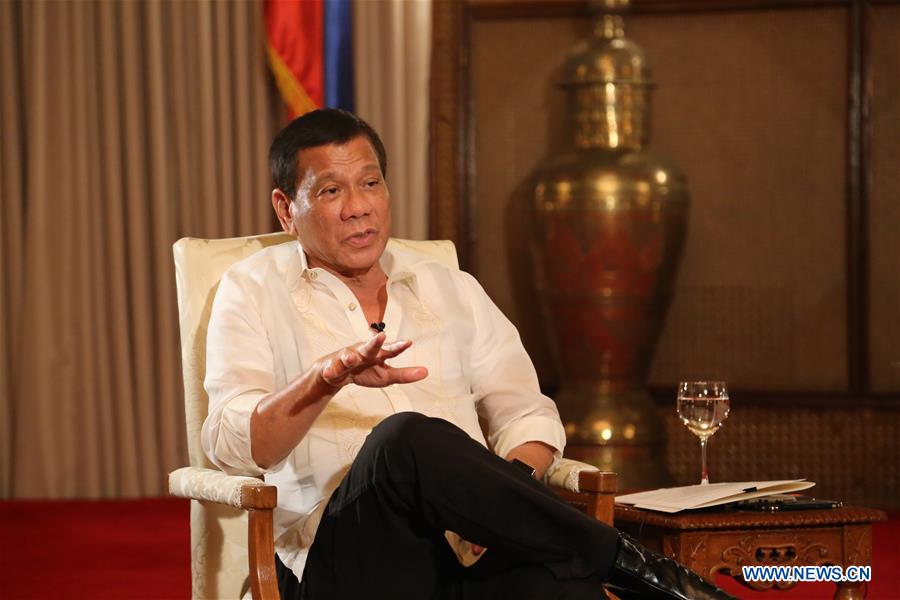 ?
?
Philippine President Rodrigo Duterte receives a joint interview with Chinese media in Manila, capital of Philippines, May 9, 2017. The Philippines is expecting to deepen its knowledge of China's Belt and Road Initiative to further identify possible areas of cooperation between the two countries, Duterte said Tuesday.(Xinhua/Wang Yu)
MANILA, May 10 (Xinhua) -- The Philippines is expecting to deepen its knowledge of China's Belt and Road Initiative to further identify possible areas of cooperation between the two countries, President Rodrigo Duterte said Tuesday.
Duterte, who will attend the Belt and Road Forum for International Cooperation scheduled for May 14-15 in Beijing, made the remarks to Chinese media in a joint interview.
Duterte said the Philippines is a developing country that relies on its connectivity with other countries in the region to develop a healthy economy and inclusive growth.
"I understand the Belt and Road Initiative is primarily an economic undertaking that will build these connections among the countries, and result in mutual benefit that includes increased trade and market access," he said.
Duterte further pointed out that the overarching objective of the Philippine government is to safeguard the prosperity and the well-being of the Philippine people.
"Healthy and robust economic exchanges are key to achieving the goal. It is our hope that many initiatives, including OBOR (One Belt One Road), can be part of these wider exchanges," he said.
The Philippine government has just unveiled "Dutertenomics," an economic strategy to transform the Philippines into an upper middle-income economy by 2022 and close to a high-income one by 2040.
Duterte said that the Belt and Road Initiative, which highlights infrastructure connectivity, highly complements the Philippine government's development plan of 2017-2022.
It "is in line with my administration's golden age of infrastructure of increased investments on infrastructure projects," he said.
Duterte said that he is going to China to attend the meeting with an aim to learn from others.
"I hope that leaders attending the forum will have productive dialogues that will enlighten us on the gaps that need to be addressed ... I would like to listen to the views of many countries around the table," he said.
"We also would want to learn from the development experiences of other participant countries, particularly with the opportunities offered by the OBOR to enhance economic growth and address global economic challenges," he said.
The Philippines is the chair of the Association of Southeast Asian Nations (ASEAN). During an ASEAN summit in Manila last month, leaders of the ASEAN countries vowed to speed up the building of the ASEAN community.
Duterte said that the Philippines appreciates China's continued support for the ASEAN community, including pushing for ASEAN-led initiatives to promote connectivity and other areas of cooperation that aim to make ASEAN a highly integrated economic community.
"We are optimistic that OBOR will further contribute to the enhancement of ASEAN-China cooperation, as it paves the way for more mutually beneficial economic activities between our two sides," Duterte said.
It will be Duterte's second visit to China as president of the Philippines since he assumed power last June. He paid a state visit to China in October. Days ago, Duterte and Chinese President Xi Jinping had a cordial phone conversation.
"President Xi and I agree that the bilateral relations of both countries have been developing quite well, and that we are progressively expanding the areas where both sides can cooperate and dialogue," he said.
He said he hoped to see more development in economic and people-to-people relations between China and the Philippines.
"I think that if we keep our minds on the benefits of peace and economic progress, and for as long as we are guided by the need for mutually beneficial relations, then I believe our relationship will continue to grow in a satisfactory and stable manner," he added.
Duterte admitted that there are still some challenges in the bilateral relationship, which includes issues on the South China Sea. "But I believe that we have many avenues to address these issues, one of which is the bilateral consultation mechanism," he said.
Duterte noted he is thankful for having the opportunity to attend the Belt and Road Form for International Cooperation "to communicate with the people of China in particular, and of course to inform China about the bilateral relations between the Chinese government and the Philippines."
"Wish Belt and Road Forum a success," Duterte said in a message at the end of the interview.



